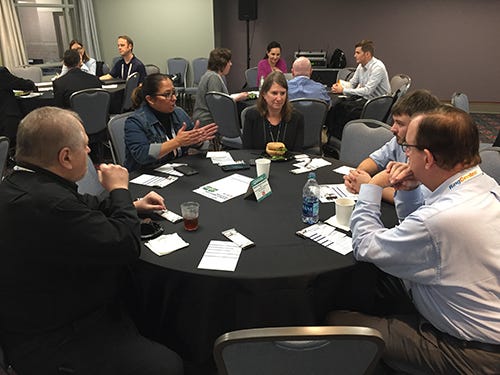Business Hackathon Serves Up Marketing Ideas
On Day One of Channel Partners Evolution, MSPs and telco agents learned some marketing strategy tips and tricks from the experts.

CHANNEL PARTNERS EVOLUTION — Business owners in the channel have not traditionally been all that enthusiastic about marketing. There’s an ambiguity to it that just doesn’t exist when talking speeds and feeds, and the payoff isn’t immediate and tangible. That was the pain point that business and marketing experts tried to address today during a Business Hackathon at the opening day of the Channel Partners Evolution conference in Philadelphia.
“It’s great that the Business Innovation Hackathon happens at the beginning of the CPE conference,” said Howard Cohen, owner of tech content production agency HMC Write Now, who ran the event. “You come away with so many new ideas, and so much fine tuning on the ideas you came to ask about. It really sets you up to get a lot more out of the entire conference.”

Howard Cohen (left) leads a roundtable discussion at the Business Hackathon.
In today’s competitive channel landscape, even the most reluctant of service providers are coming around to the reality that they can no longer just get by on word-of-mouth referrals, no matter how well it’s worked for them in the past. From leveraging marketing development funds (MDF) to developing a personal brand, the five-hour event taught business owners from both the IT and telco channels some key business hacks designed to help them market, promote and sell their services.
“One of the things I find most interesting at the Hackathon happens when you get telecom professionals and tech professionals like MSPs at the same table,” said Cohen. “The synergies between the two channels are filled with so much potential and you get to feel it at those tables. We need more opportunities to have such impactful dialogue!”
Mary Stanhope, founder and principal consultant of Boston-based marketing agency iMarket2, taught attendees about the power that a compelling story carries. We are bombarded with 100,000 digital words a day, says Stanhope, and with all that noise, businesses that sound like every other business are quickly and easily forgotten. We remember the stories that capture our attention and the unique qualities that set one company apart from the rest. In fact, people are 22 times more likely to remember facts conveyed to them in a story than through a list of bullet points, according to Stanhope. And the key to a compelling story that will make clients remember you?
“Remember, you’re not the hero in this story,” advises Stanhope. “Make the customer the hero, then introduce yourself as the trusted adviser, the guide that can help them achieve their goals.”
It isn’t only your company’s brand that matters. Kyle Burt, founder and lead consultant at Dallas-based MSP Catch Solutions, says your personal brand is just as critical. If you can build a following based on the characteristics that both your personal…
…and your business brand have in common, you’re golden.
Burt is living proof that this approach works. During his session, he shared with attendees how he turned his own YouTube series into a social media force dubbed #CatchKyle that caught the attention of companies like AT&T, which reached out to him based upon his popular weekly broadcast. Today, Burt co-hosts the online TV show and podcast #CoffeeWithKyles every week with co-creator Kyle Witham to propel Catch Solutions and further promote his brand.
As the strategic program manager at Synnex, Heather Harlos knows about communicating with style, the topic of her workshop at today’s Hackathon. Harlos has spent the bulk of her career in marketing and brand strategy, and she broke down exactly what branding is to her table of channel partners.
“Every time I interact with someone, I show them who I am,” said Harlos. “My brand is what other people say about me.”
Harlos says if business owners take a systematic approach to brand building, it doesn’t have to be overwhelming. Step by step, identify what makes your brand different, what others are saying about it and how you describe it. Then define a marketing initiative using goals that are specific, measurable, achievable, relevant and time-bound (SMART).
Read more about:
AgentsAbout the Author
You May Also Like


